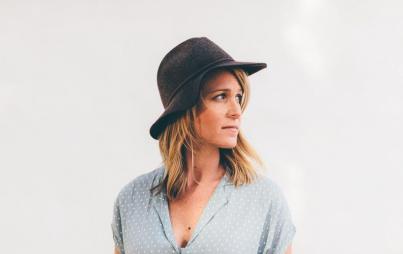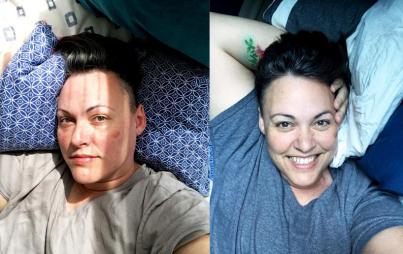
"I save dresses for the kinds of “special occasions” where it’s easier to wear a dress than to argue with people about why I didn’t wear a dress."
In honor of Fashion Week, Vogue's September Issue, and all the fun the comes with fall fashion, we'll be talking about plus-size fashion — otherwise known as "fatshion" — throughout this next week! Plus-size style boasts its own beautiful, unapologetic brand of contemporary fashion, and we've curated a range of writing that aims to capture both its political roots and unique aesthetic. Find the rest of the stories featured in The Fatshion Conversation here.
Am I femme?
I slouch. I wear my hair in a ponytail and don’t know how to do anything with it, but I spend lots of money on nail polish and makeup. My best friend and I buy our wide-leg skater jeans and band T-shirts together at the mall so we can get a discount, and everything else we own is used. I rummage through my dad’s closet and steal anything that isn’t nailed down: polo shirts, plaid, the brown polyester bellbottoms he got married in.
I’m 15-going-on-30, or so my mother tells me, and I can still buy clothes in regular stores, though I’m starting to get close to the end of the line. This confirms what I have known since my first diet five years before: that I am desperately fat and that this is a problem. I hide my body, which I learned to do the hard way. If I was allowed to leave the house showing any kind of belly, I was quickly reminded that fat chicks were forbidden from such displays. So I zip up my hoodie and cut my hair short. I resent the restrictions, but I also love these clothes. They hold me in an embrace, make a mystery out of my form. I feel strong, if not sexy.
You Might Also Like: 10 Minimal And Androgynous Looks For Plus-Size Bodies
Am I femme?
I’m in six-inch platform heels and I wobble in one place, not daring to take a step unaided, my whole mind on my ankles. Don’t fall, don’t fall, don’t fall. The corset limits my movement, the garter belt holds up thigh-high Cuban-heel silk stockings. I’m topped with red lips, black lashes, curls for days. I am wearing my uniform, a present wrapped and ready to be opened, to be photographed, to be monetized and consumed. The clothes are uncomfortable, but the freedom feels good. I feel strong — and sexy.
At 21, after dropping out of university, finding myself broke, jobless, and almost entirely sexually inexperienced in the real world, I took my fascination with phone sex and web camming and turned it into an income stream. If I wanted to make it work, I needed to do more than just think about sex. I needed to be sexy.
So I took the route most expected of fat women and people read as women: femme. We call ourselves “curvy” and BBWs (“big, beautiful women”) and are expected to show off those curves. We accentuate that bigness so long as it’s in the right places: boobs, belly, and butt. Positive images of fat people with these attributes are overwhelmingly hyperfeminine. When we don’t put forth the effort to conform to that femme standard, we are much more likely to be desexualized and called lazy, or manly, or otherwise trotted out as examples of why fatness is terrible and disgusting.
Femme, as it’s expected, isn’t easy for me. It seems to demand from me labor I’m increasingly less willing or less able to undertake as a mentally ill person who likes to think they give zero fucks. When it’s profitable, it can be a worthwhile endeavor, but the pressure to perform under much less rewarding circumstances is unyielding.
I play with femme-ness sometimes. It’s a costume I might put on when it’s expected of me, or a tool I might use to feel safe, but it isn’t who I am.
Am I femme?
I can’t be bothered to shave, but I have plenty of tights to wear with shorts if I need to cover up. I don’t wear heels, but I still own a pair of black pumps… just in case. I save dresses for the kinds of “special occasions” where it’s easier to wear a dress than to argue with people about why I didn’t wear a dress. I have a comfortable skirt I might wear on laundry day.
I buy nearly all my clothes from thrift shops and the selection in my size is limited. Clothing that fits me in the aforementioned boobs, belly, and butt areas tend toward feminine cuts with V and scoop necks; floral designs and fake gemstones; yoga pants and tapered-fit jeans. When I go out on dates or stay in with my partner, I still feel an internal pressure to perform femme in these ways. I rock short hair with curls, and I love a comfy old man sweater.
As I have learned a language through which to understand and communicate my gender, I’ve grown to appreciate fucking with the idea of "femme" in my presentation. But am I femme?
For some, femme is an identity. Most of the time, if someone says “women and femmes,” I don’t count myself as included in that sentence. I play with femme-ness sometimes. It’s a costume I might put on when it’s expected of me, or a tool I might use to feel safe, but it isn’t who I am. But the body I have means I'm read and treated as a woman or femme all the time, in whatever I wear, which means I get to experience misogyny and misgendering all at once. Boobs, belly, and butt. They give me away, expose me, and they are too large these days to hide in skater jeans and hoodies, even if I wanted to stop being so unapologetically, unabashedly fat.
Am I femme?
No. I’m nonbinary. If you care about me and the people like me in your life, you won’t use the phrase “women and femmes” when you want to include me in your movement. I am here for a fight for the rights of all women, and femmes, and read-as-femmes like me, no matter how we choose to wield, or not wield, femininity. Are you here for me?








